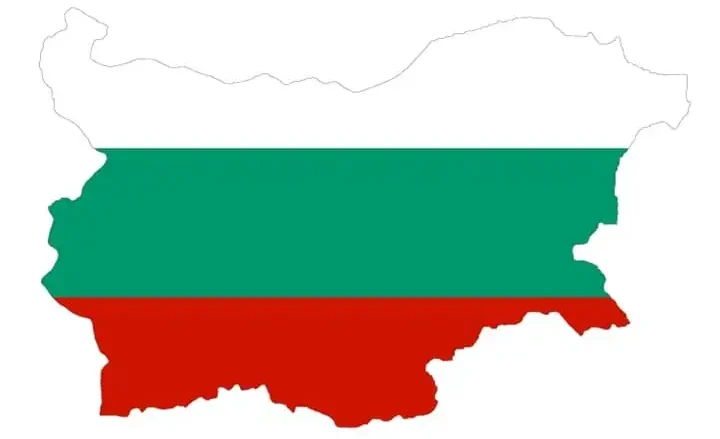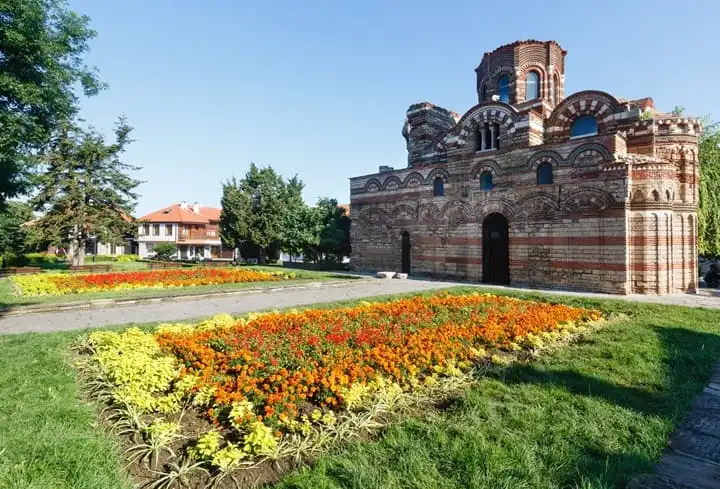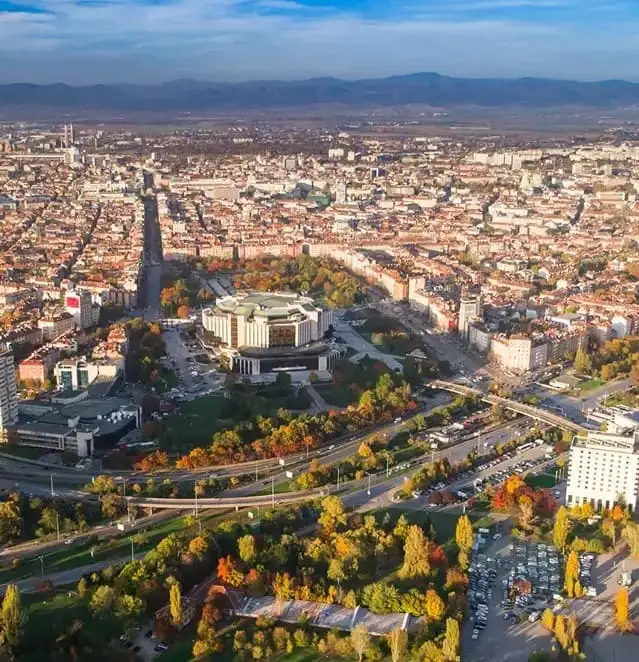Population
GDP (per capital)
Visa-Free Countries
GDP (purchasing power parity)
-
How to Immigrate to Bulgaria Through Investment
-
Immigrating through investment offers foreign investors a pathway to residency while opening doors to new opportunities. Bulgaria, with its EU membership, affordable living costs, and strategic location, is becoming an increasingly popular destination for those seeking to invest in Europe.
- Main Industries
- Tourism and Hospitality
- Wholesale and Retail Trade
- Manufacturing Industry
- Agriculture and Food Production
- Fishing and Fish Processing Industry
- Electricity and Gas Supply

EET (UTC+2)
110,993 km2
Euro
Sofia
Bulgarian

-
Why Choose Bulgaria for Investment
- EU Membership As a member of the European Union, Bulgaria offers investors the advantage of free movement within the EU, access to a unified market, and enhanced political and economic stability.
- Cost of Living and Business Opportunities Bulgaria boasts a significantly lower cost of living compared to many Western European countries. The average cost of living is approximately 40.5% lower than in the United States, with rent being about 72.9% more affordable. This affordability extends to business operations, making it an attractive destination for entrepreneurs.
- Tax Benefits The country maintains a competitive tax environment, featuring a flat corporate income tax rate of 10%. Additionally, Bulgaria offers various tax incentives, such as partial exemptions for investments in high-unemployment regions and deductions for hiring long-term unemployed individuals.
- Growing Economy While Bulgaria's GDP growth is projected to be 1.6% in 2025, there are promising opportunities in sectors like information technology, manufacturing, agriculture, and tourism. The government's focus on infrastructure development and EU-funded projects is expected to stimulate economic activity and investment.

Investment Pathways for Immigration
There are several ways to immigrate to Bulgaria through investment, with real estate being one of the most popular options. By purchasing property, foreign investors can not only gain a valuable asset but also open the door to residency in Bulgaria. Below, we’ll explore the steps, requirements, and benefits of pursuing real estate investment as a means to gain Bulgarian residency.
Investment in Real Estate
Investment in Real Estate
Process
- Find Property: Research suitable properties, including residential or commercial.
- Legal Procedures: Hire a lawyer to verify property status.
- Preliminary Contract: Sign an agreement with deposit and terms.
- Final Notary Act: Finalize the sale at a notary and register with the Land Registry.
- Residence Application: Submit the residence permit application after purchase.
Requirements
A minimum investment of €300,000 is generally required for properties in cities like Sofia and Plovdiv. Foreign investors can buy property, but purchasing land may require setting up a company, especially for non-EU nationals.
Benefits
- EU Residency: Enables living and working in the EU.
- Stable Investment: Competitive pricing, especially compared to Western Europe.
- Rental Income: Opportunities for passive income through property rental.
Risks
- Market Volatility: Fluctuations in property values, particularly in rural areas.
- Legal Complications: Non-EU buyers may face hurdles, such as needing to set up a company for land purchase.
- Bureaucracy: The process can involve complex legal and administrative steps.
Business Investment
Business Investment
Process
- Business Plan: Prepare a comprehensive business plan outlining the nature of the business, the investment amount, and projected job creation.
- Company Registration: Register the company with the Bulgarian Commercial Register. This involves selecting a company type, such as a limited liability company (LLC).
- Licenses and Permits: Obtain any necessary industry-specific licenses and permits.
- Tax Registration: Register with the tax authorities and obtain a tax number for the business.
- Hiring Employees: Hire local employees, ensuring compliance with Bulgaria’s labor laws.
Requirements
To qualify for residency through business investment, a minimum investment amount is typically required, starting at around €50,000. In addition, business owners are often expected to create a certain number of jobs, with priority given to sectors such as high-tech, manufacturing, and IT. Other requirements may include the establishment of a registered company, compliance with labor laws, and fulfilling local investment guidelines.
Benefits
- Lower Taxes: Bulgaria offers one of the lowest corporate tax rates in the EU, set at a flat 10%.
- EU Market Access: Owning a business in Bulgaria grants easy access to the broader EU market, with minimal trade barriers.
- Economic Incentives: Incentives such as grants for technology startups and tax breaks for creating jobs in high-unemployment areas make Bulgaria attractive for investors.
Risks
- Competition: Certain sectors, particularly IT and high-tech, may face significant competition as Bulgaria becomes an increasingly popular destination for businesses.
- Bureaucracy: Although the country has streamlined many business processes, navigating local regulations and administrative procedures can still be complex.
- Market Challenges: Foreign entrepreneurs may find it challenging to establish themselves in a new market, requiring time and local knowledge.
Government-Approved Investment Programs
Government-Approved Investment Programs
Process
- Pre-Approval: Apply to the Invest Bulgaria Agency for initial approval.
- Investment: Transfer the required amount into a qualifying investment fund.
- Visa Application: Apply for a long-term D visa at a Bulgarian diplomatic mission.
- Permanent Residency: Upon arrival in Bulgaria, complete biometric data collection and receive a residency card.
- Citizenship: After five years of holding permanent residency, apply for Bulgarian citizenship, subject to meeting all legal requirements.
Eligibility Criteria
- Minimum Investment: €512,000 in a government-regulated Bulgarian investment fund.
- Investment Vehicle: Funds must be licensed by the Bulgarian Financial Supervision Commission and focus on Bulgarian assets.
- Additional Requirements: Applicants must demonstrate a clean criminal record, provide proof of the source of funds, and meet health and security criteria.
Benefits
- Immediate permanent residency with no minimum stay requirements.
- Eligibility for EU citizenship after five years.
- Access to Bulgaria's favorable tax regime, including a flat 10% corporate tax rate.
- Visa-free or visa-on-arrival access to numerous countries.
Risks
- High financial commitment with a five-year investment lock-in.
- Program eligibility and requirements subject to change based on government policies.
- Potential for market fluctuations affecting the value of the investment.
Requirements for Bulgaria Residency
-
Basic Eligibility Criteria
- To qualify for residency through investment in Bulgaria, applicants must meet several fundamental criteria. These typically include:
- Proof of Funds: Demonstrating the legal source of the investment funds, whether through real estate, business ventures, or government-backed schemes.
- Clean Criminal Record: A background check to confirm no criminal history, ensuring the applicant's suitability for residence.
- Health Insurance: Evidence of health coverage either in Bulgaria or through an internationally recognized provider.


-
Bulgaria Residency Application Process
- The process to obtain residence through investment generally involves the following steps:
- Document Preparation: Gather all necessary documents, including proof of investment, criminal record clearance, and health insurance.
- Visa Application: Submit an application for a Type D visa at the Bulgarian consulate in your home country. This process includes an interview and review of your investment intentions.
- Approval: After submitting your documents and meeting the necessary criteria, the Bulgarian authorities will process the application, which may take several weeks to months.
- Residency Registration: Upon entering Bulgaria, applicants must register with the local Migration Directorate.
- Permanent Residency: After holding temporary residency for a specified period (usually 5 years), you may apply for permanent residency, provided you maintain your investment and comply with the country’s regulations.
Path to Permanent Residency and Citizenship
Duration of Residency
After obtaining a Type D visa and establishing temporary residency, it typically takes 5 years to transition to permanent residency in Bulgaria. During this time, investors must maintain their qualifying investment (e.g., in real estate or business) and comply with all residency requirements. Temporary residents are expected to fulfill basic obligations, such as registering with local authorities and paying taxes, in order to secure permanent status.
Naturalization
Once permanent residency is granted, the next step for those wishing to become Bulgarian citizens is naturalization. After a minimum of 5 years as a permanent resident, individuals can apply for citizenship. The naturalization process involves several key requirements:
- Language Proficiency: Applicants must demonstrate a basic understanding of Bulgarian, typically through a language test.
- Integration: Successful integration into Bulgarian society is also important, which may include showing evidence of employment, community involvement, or economic contribution.
- Clean Record: Maintaining a clean criminal record is essential throughout the residency and citizenship process.
Taxation and Financial Considerations
- Bulgaria offers a favorable tax environment for investors, with some of the lowest tax rates in the European Union. The corporate tax rate is set at a flat 10%, providing an attractive option for business owners. Similarly, personal income tax is also flat at 10%, which simplifies financial planning for individuals. Additionally, the country imposes a 20% VAT on most goods and services, though certain essential items are exempt or reduced.
- Investment Returns: Investing in Bulgaria can offer solid returns, particularly in real estate, technology, and manufacturing sectors. While property investments in major cities like Sofia or Plovdiv may generate substantial rental yields, emerging industries present opportunities for higher long-term capital growth. Furthermore, residency can provide financial benefits, such as tax incentives and access to the broader EU market, which opens up additional revenue streams for businesses.
- Wealth Management and Tax Planning: To optimize financial outcomes, it is highly recommended that investors seek guidance from a financial advisor or tax consultant. These experts can help navigate the country’s tax structure, devise efficient wealth management strategies, and ensure compliance with all local regulations. Through proper planning, investors can maximize returns, minimize liabilities, and take full advantage of Bulgaria’s attractive tax policies.


-
Challenges and Considerations
- Bureaucracy: Investors should be prepared for potential bureaucratic delays. Administrative procedures can be complex, requiring attention to detail when dealing with local regulations and authorities.
- Language Barriers While many Bulgarians speak English, understanding Bulgarian is essential for legal and official matters. Hiring translators or bilingual advisors can help navigate these challenges.
- Long-Term Commitment Investment-based immigration is a long-term process. Market risks and political stability should be carefully considered, as maintaining the investment for several years is necessary for residency and citizenship.
Conclusion
Immigrating to Bulgaria through investment offers a unique opportunity for individuals seeking residency within the European Union. With its strategic location, favorable tax policies, and emerging business sectors, Bulgaria remains an attractive destination for investors. While the process requires careful planning, understanding the legal requirements, and committing to long-term goals, the benefits—such as access to the EU market and potential citizenship—are significant. By navigating challenges like bureaucracy and language barriers, investors can successfully establish themselves in this dynamic and growing country.
FAQ about Investment in Bulgaria
1. What are the minimum investment requirements for obtaining residency in Bulgaria?
The minimum investment varies depending on the pathway. For real estate, it generally starts around €300,000. Business investments require a similar or higher threshold, depending on the scale and job creation.
2. Can I apply for Bulgarian citizenship after obtaining residency?
Yes, after maintaining permanent residency for at least 5 years, you can apply for Bulgarian citizenship, provided you meet language and integration requirements.
3. Do I need to speak Bulgarian to get residency or citizenship?
While knowing Bulgarian is not mandatory for residency, it is required for citizenship. A basic proficiency test is part of the naturalization process.
4. How long does it take to obtain residency through investment?
It typically takes several months to obtain a Type D visa, followed by 5 years of temporary residency before transitioning to permanent residency.
5. Are there tax benefits for investors in Bulgaria?
Yes, Bulgaria offers favorable tax policies, including a flat 10% corporate and personal income tax rate, which makes it an attractive option for investors.
Looking for expert visa support?
PROGRAM MATCH
Compare the different programs in a nutshell and discover their features
PROGRAM COST
Check the cost estimates for each offered program
PROGRAM MAP
Explore the power of global mobility for every passport in the world
